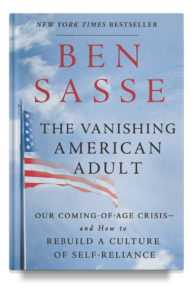It’s time to get back to primary sources and permanent things.
There’s an intense focus on the political polarization that seems to be dividing our nation and causing a great schism among our populace. But the greatest risk to our national future isn’t a political one, it’s a cultural one. Our republic requires a resilient, literate, and thoughtful citizenry, well grounded in the principles on which this nation was founded. As Ronald Reagan once said, “Freedom is never more than one generation away from extinction. We didn’t pass it to our children in the bloodstream. It must be fought for, protected, and handed on for them to do the same.” But increasingly, it feels like our younger generations are taking our rights and liberties for granted. We are forgetting our history, and our shared story. We are failing our young people if we fail to pass on the baseline of knowledge about what serves as the foundation of our system of government and the basics of our democracy. But we can restore what we’ve begun to lose. Through a shared national canon of great works – an agreement about what literature all Americans must digest to fully comprehend the underpinnings of our democratic system and our national history, we can once again ensure the strength of our national future.
This has never been more urgent. Today Americans are increasingly informed by news that fits their preconceived ideas and opinions and declare as “fake news” anything that doesn’t fit with their personal belief system. This is the antithesis of what our founders had in mind. They envisioned a society in which our citizens would debate, argue, and struggle with ideas, not one where we closed ourselves off to uncomfortable opinions and only spoke within our own echo chambers. For the preservation of our country, we must move past our current phase of shallow understanding and willful ignorance and get back to the deep understanding of the core ideas that make us a nation.
To do this, we must wrestle with the great ideas in an array of fields and topic areas. These include writings about God, the American idea, great American literary fiction, the nature of man and things, markets and economic theories, and history. We won’t agree with everything we read and may reject outright much of what’s been written, but to do that, first we must wrestle with it. We must consider primary sources, not just learn the sound bites that schools and others may feed us about great works. We have to read the words that great authors and thinkers that came before us wrote to help form the foundations of the society we have inherited. And we have to constantly question our assumptions and be open to new perspectives and ways to see the world.
There must always be a list of books – either a mental list, one written with pen and paper, or a stack of to-be-read books on a shelf – that we push ourselves to consume. We must be relentless in our pursuit of knowledge and a deeper understanding of our nation and the world around us. It is only through this deep commitment to understanding our foundational principles and creating a community of readers and thinkers that we will strengthen the nation we inherited.

 A101 Team
A101 Team 